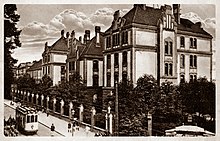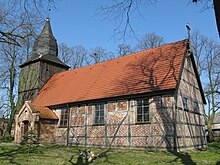August Reckling
August Friedrich Bernhard Reckling (born November 16, 1843 in Wendisch Priborn , † December 30, 1922 in Dobbertin ) was a German military musician and composer.
Life
August Reckling was the son of the tailor Hans Pratow and Friederike, geb. Martens. It got its later name after his stepfather Karl Reckling. Nothing is known about his youth.
At the age of 22, August Reckling joined the Mecklenburg-Schwerin Jäger Battalion as a three-year-old volunteer on June 11, 1864 , which was founded as a light infantry battalion on June 1, 1821 and, in 1867, when the military convention with Prussia was concluded, the name Grand Ducal Mecklenburg Jäger Battalion No. 14 . The garrison location at that time was Ludwigslust . On October 1, 1867 he became a regular French horn player and on December 24, 1869 a surplus sergeant .
As a bugler in the 2nd Company, he took part in the battalion's campaigns in the German War in 1866 and in the Franco-German War in 1870/71. On September 24, 1871, he was promoted to horn player . His battalion commander justified this suggestion as follows: The horn player Reckling has a scientific and thorough musical education, has made himself known through larger compositions that have gained general recognition. He composed 17 marches, 2 funeral marches, 13 dances and 7 larger works, which are generally popular, namely the marches are widespread throughout the army and are played with preference. He has also arranged 2 festival marches, 22 dances, 44 songs and 44 larger works for brass music and 13 different works for string music, which speak for the musical talent of the horn player Reckling. With great skill he leads the music corps subordinate to him, which has received a well-deserved reputation and is very popular with the local audience. It should also be emphasized the excellent influence that he exercises on his subordinates, who obey him unconditionally, but also respect and adore, to whom he is a shining example, through faithful fulfillment of duty, through his solid, solid character, through his appealing, modest manners , by his tactful, careful demeanor and by his military virtues.
Until 1890 he was head of the Schwerin Battalion Music. In his musicians' unit there were 21 to 23 French horn players as sergeants and chief hunters, all of them in non-commissioned positions. The new garrison location was meanwhile Schwerin .
On February 25, 1883, the Grand Duke Friedrich Franz II appointed him music director of the Grand Duke of Mecklenburg . In the order to the command of the contingent it was said: We want the horn player of our Jäger Battalion Nro. 14, Reckling, hereby grant the title of music director with grace.
When the battalion was moved from its previous location in Schwerin to Colmar in Alsace in 1890 , he said goodbye and retired at the age of 47. From 1890 to 1902 he was music director of the Schwerin city band and temporarily also of the Grand Ducal Marstall choir and lived at Rostocker Str. 40, today's Goethestrasse in Schwerin. The decade from 1891 to 1902 was his most productive time as a composer. Two fanfare marches also date from these years.
In 1873 the Association of Mecklenburg Foresters was founded. Reckling became a member in 1877 and documented this interest in forestry through a 34-year membership until 1911. As early as 1876, Reckling had the hunter's march Waidmannsheil composed by him based on the Transylvanian hunter's song (also known as hunter's love song ) by Franz von Schober and for the Mecklenburg Foresters Association Dedicated to Franz Schubert . The lyrics became popular with Reckling's melody. The forest association decided ... to dedicate a tactir stick adorned with matching emblems to the horn player Reckling for the hunter arch Waidmannsheil, which he composed and dedicated to the association. This baton was made by the jeweler Arnold in Schwerin and cost 93.50 marks. The annual fee in the forest association was 6 marks at that time. With this valuable gift, the forest association expressed its gratitude and appreciation for Reckling. Reckling's superior, Major Friedrich von Strantz (1832–1909) as head of the Jäger Battalion, thanked him again ... for the award his staff horn player had received. The march, which the trio also Lützows wild swashbuckling hunting ( Theodor Körner / Carl Maria von Weber ) and the folk song in the woods and on the heath quoted was well tester to stretch-form composition and is considered one of the most beautiful and still most popular fighters marches.
A highlight of his professional life was the celebrations for the 75th anniversary of his old military unit in 1896. On this occasion, Reckling dedicated the Jägermarch to the 14th Jäger Battalion : Song of the 14th Jäger. This hunters march became the unofficial parade march of the 14th hunter battalion. From the celebrations in Schwerin it was reported that the town band , to the cheering music of the music director Reckling, who wore the uniform of the Jäger Battalion, started the pageant from the Schelfmarkt to the old Jäger grenadier barracks at Werdertor, to the memorial there for the fallen hunters from 1870 / 71 and then to the monument of Grand Duke Friedrich Franz II in the palace garden.
From 1902 he lived with his wife and unmarried daughter again in his birthplace Wendisch Priborn. There he was described as a friendly, medium-sized, strong and somewhat taciturn appearance. In the last years of his life he stayed in the Dobbertin monastery , where his son Karl Reckling had been the last chef since 1916 , and was the administrative director of the state monastery as a finance officer. Born in Wendisch Priborn in 1877, he married the daughter Gertrud of the local pastor Bahlke in Stuer in 1908 . As a senior administrative officer and naval directorate secretary in the military authority in Kiel , he was hired from 112 applications after a probationary period on April 1, 1917 as kitchen master in the Dobbertin monastery. After the state monastery was dissolved in 1919, Karl Reckling was transferred to Schwerin as senior administrative inspector.
Karl-August Reckling was a grandson of August Reckling.
August Reckling died of pneumonia on December 30, 1922 at the age of almost 80 in Dobbertin Monastery. On January 3, 1923, he was buried in Wendisch Priborn, where his grave site has been preserved. A plaque commemorates him in the Wendisch Priborn church.
Of the marches he composed, the Revue-Marsch and Waidmannsheil were included in the army march collection , are in the march books of the Bundeswehr and are still played today.
Awards
- Grand Ducal Music Director.
- Merit Medal of Friedrich Franz I. The honest man and the good citizen in silver March 20, 1885
- House Order of the Wendish Crown , Silver Cross of Merit June 11, 1889
Works
- Revue March 1886 ( AM II, 258; HM II, 115)
- Waidmannsheil on a text by Franz von Schober , 1876 (AM II, 265; HM II, 122 opus 52)
- Jägermarsch , parade march of the 14th Jäger Battalion for the 75th anniversary in 1896; Text: Albert Wolf
- Hubertus Overture
- Waidmann's cheering quadrille
- Great hunting imagination
- O God for king and country
literature
- Klaus-Ulrich Keubke: A talented military musician from Mecklenburg. SVZ, Mecklenburg-Magazin January 22, 2015, p. 25.
- Klaus-Ulrich Keubke: Military music and military musicians in Mecklenburg around 1900. Schwerin 2014 ISBN 978-3-00-047854-3
- Grete Grewolls: Who was who in Mecklenburg and Western Pomerania. The dictionary of persons . Hinstorff Verlag, Rostock 2011, ISBN 978-3-356-01301-6 , p. 7968 .
- Klaus-Ulrich Keubke: Mecklenburg Military History. Schwerin 2000 ISBN 3-00-005910-5
- Heinz Geisterfeld: August Reckling. In: Forest biographies from Mecklenburg-Western Pomerania. 1999, pp. 234-238.
- Wolfgang Suppan, Armin Suppan : The New Lexicon of Brass Music. 4th edition. Blasmusikverlag Schulz, Freiburg-Tiengen 1994, ISBN 3-923058-07-1 .
- Iris Köhler-Terz: Grand Ducal Music Director comes from Wendich Priborn. Plauer Zeitung, Vol. 98, 1993 No. 26, p. 22.
- Joachim Toeche-Mittler: Reckling. Military Music Working Group in the German Army Research Association, Bulletin No. 20, October 1983.
- Hermann Milenz: Mecklenburg music history up to 1933. Schwerin 1936.
- Hermann Milenz: About military music and military musicians (music conductors) in Mecklenburg. Schwerin 1932.
- Mecklenburgische Zeitung, year 1896 No. 249, 250.
Unprinted sources
-
State Main Archive Schwerin (LHAS)
- LHAS 2.12-2 / 18 Military (Acta Militaria)
- LHAS 3.2-3 / 1 Provincial Monastery / Monastery Office Dobbertin.
- LHAS 5.2-1 Grand Ducal Cabinet III. No. 6353, Mecklenburg Jäger Battalion No. 14. 1860–1941.
- LHAS 5.12-8 / 1 Military Department
- Musical collection
Web links
- Literature about August Reckling in the state bibliography MV
- August Recklinghausen at Discogs (English)
- Waidmannsheil , photo on an Edison roller from 1908, Central and State Library Berlin
Individual evidence
- ^ Robert Freiherr von Langermann and Erlenkamp : History of the Grand Ducal Mecklenburg Jäger Battalion No. 14 from June 1, 1821 to June 1, 1881. Schwerin: Stiller 1811, p. 297 and 309
- ^ Klaus-Ulrich Keubke: A talented military musician from Mecklenburg. SVZ, Mecklenburg-Magazin, January 22, 2015 p. 25.
- ↑ LHAS 5.12-8 / 1 Military Department . No. 1069.
- ↑ LHAS 5.12-8 / 1 Military Department . No. 1069.
- ^ Klaus-Ulrich Keubke: A talented military musician from Mecklenburg. SVZ, Mecklenburg-Magazin January 22, 2015, p. 25.
- ^ Heinz Geisterfeld: August Reckling. 1999, p. 235.
- ^ Heinz Geisterfeld: August Reckling. 1999, p. 236.
- ↑ Waidmannsheil
- ^ Landesbibliothek Schwerin, music collection.
- ↑ Mecklenburgische Zeitung, 1896, No. 249, 250.
- ↑ LHAS 3.2-3 / 1 Landeskloster / Klosteramt Dobbertin. No. 341, 385c.
- ↑ LHAS 5.12-8 / 1 Military Department No. 1069.
- ^ Government Gazette for Mecklenburg-Schwerin. Official supplement 1885, p. 69.
- ^ Government Gazette for Mecklenburg-Schwerin. Official supplement 1889, p. 110.
| personal data | |
|---|---|
| SURNAME | Reckling, August |
| ALTERNATIVE NAMES | Reckling, August Friedrich Bernhard (full name) |
| BRIEF DESCRIPTION | German military musician and composer |
| DATE OF BIRTH | November 16, 1843 |
| PLACE OF BIRTH | Wendisch Priborn |
| DATE OF DEATH | December 30, 1922 |
| Place of death | Dobbertin |

